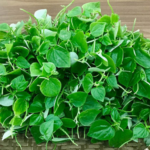Ginger is a versatile root with a long history of use in traditional medicine and cuisine. It is prized for its nutritional profile, boasting protein, carbohydrates, vitamins C and B6, and active compounds like gingerol and shogaol. Ginger’s benefits range from detoxification and improved blood circulation to enhanced immunity. A warm cup of ginger tea with honey is a comforting remedy during cold winter days.

Ginger, a treasure tro of nutrients, offers a plethora of health benefits.
In daily meals, ginger is an indispensable spice in every kitchen. Its distinctive pungency enhances the flavor of dishes and eliminates any unpleasant odors. Imagine a hot plate of crab stir-fried with ginger and scallions—the ginger accentuates the crab’s sweetness, making it irresistible.
Proper Ginger Storage Methods
Aside from its myriad benefits, ginger is also renowned in traditional medicine for alleviating motion sickness and nausea. Placing a slice of ginger on the navel is an effective remedy for motion sickness.
However, improper storage can lead to wrinkled, sprouted, and deteriorated ginger. To maintain its freshness and nutritional value, try these simple preservation methods:
Method 1: When purchasing ginger, refrain from washing off the soil attached to its surface. This layer of dirt acts as a protective barrier, helping to preserve the ginger’s freshness for longer. As ginger is prone to moisture retention and spoilage, sun-dry it to ensure the outer layer is dry. Then, find a paper box and perforate small holes in it for ventilation.

Retain the soil layer on the ginger’s surface for extended freshness.
Line the box with a sheet of paper towel or newspaper, sprinkle a small amount of salt onto it, and then wrap the ginger in the paper. Secure it with plastic wrap to create an airtight seal. Finally, store the ginger in the refrigerator; with this method, it can last for up to six months without spoilage. The salt will absorb excess moisture, forming a protective layer that prevents bacterial and mold growth.
Method 2: Alternatively, you can wash the ginger, slice it thinly, and prepare a basin of water. Add about 6 grams of salt to the water and stir to create a concentrated salt solution. Soak the ginger in this solution for approximately 15 minutes, then remove it and air-dry in a cool, ventilated area. Once dry, transfer the ginger to an airtight container and store it in the refrigerator for convenient access whenever needed.
Method 3: Prepare a flower pot by spreading a thin layer of sand at the bottom, then place the ginger inside and cover it with another layer of sand. If the surface sand appears dry, sprinkle a small amount of water to maintain moisture. This storage method will keep your ginger as fresh as newly purchased.
“Don’t Toss Overripe Bananas: Learn the Japanese Trick of Banana Vinegar with Amazing Health Benefits”
Introducing a unique twist to your daily routine – immerse yourself in the intriguing world of pickled bananas. Yes, you read that right! This unconventional pairing offers a plethora of health benefits that will leave you surprised. Imagine biting into a tangy, sweet, and slightly crunchy banana slice – an explosion of flavors that not only tantalizes your taste buds but also boosts your well-being. From improving digestion to providing essential nutrients, this unusual treat is a game-changer. So, get ready to embark on a culinary adventure and discover the wonders of bananas soaked in vinegar. It’s time to spice up your life, one pickled banana at a time!


































